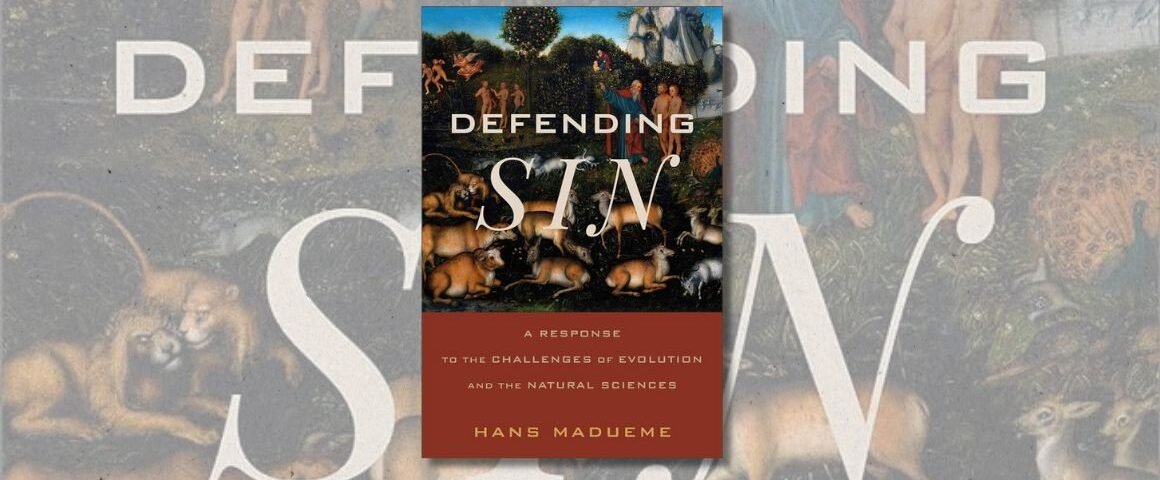Defending Sin: A Response to the Challenges of Evolution and the Natural Sciences. By Hans Madueme. Grand Rapids: Baker Academic, 2024. 368 pp. $61.53 (hardcover), $29.99 (paper).
For many years now, Christians who aspire to be thoughtful and informed have sought to emphasize the harmonious consistency of Christianity and science. On this perspective, conflicts between the two are mostly or entirely imaginary. Granted, some accommodations to scientific consensus have had to be made along the way—perhaps most prevalently in the form of theistic evolution and its concomitant revision of the doctrines of human origins, sin, and so on—but the result has apparently been a more intellectually respectable Christianity that can better appeal to those who have questions or doubts, both inside and outside the Faith.
In Defending Sin, Hans Madueme puts forth a countervailing assessment of the contemporary relationship between science and Christianity. Chapter 1 outlines the history of “creative yet unsatisfying strategies by Christians to avoid the perception of deep conflicts between science and Holy Scripture” (6). In Madueme’s view, such conflicts have indeed often been exaggerated, but this “does not negate real instances of conflict between scientific understanding and the knowledge of faith” (40). These “creative yet unsatisfying strategies”—not least the notion that biblical revelation is accommodated to limited human understanding, and in particular that the Bible should not be treated as a source of scientific knowledge—served to undermine confidence in the Bible’s “epistemic authority” (6) on “primeval history and the natural world” (42). In light of this historical trend of weakening faith in biblical authority, Chapter 2 proposes a different methodology for navigating conflicts between science and Christianity known as “biblical realism,” which Madueme defines as “five core commitments”:
(1) Supernaturalism contends that the natural sciences should be open to supernatural realities when seeking to understand God’s world. (2) Dogmatic inerrancy sees biblical authority not as an evidential or apologetic argument but as a presupposition of faith. (3) Scientific fallibilism recognizes the inevitable fallibility of science and places it within a larger eschatological framework. (4) Doctrinal confidence reminds us that central doctrinal beliefs receive their epistemic warrant from Scripture and should therefore not be revised (or abandoned) in the face of conflicting scientific theories. (5) An eclectic method holds that no single method should regulate how Christians ought to engage with scientific theories, but that we should instead evaluate such theories on a case-by-case basis. (44‒45)
Armed with this competing approach to faith and science, Madueme spends the rest of the book applying it as he unfolds the traditional doctrines of human origins (Chapters 3‒5) and the Fall (Chapters 6‒8) against the backdrop of adverse theories in fields such as geology, evolutionary biology, genetics, and neuroscience. Potential readers should be aware that, in doing so, Madueme does not offer anything like a comprehensive rebuttal of such theories. For example, while he acknowledges that “standard archaeology dates ANE [Ancient Near East] civilization as far older than anything sanctioned by a biblical chronology” (108), he does not then explain how the archaeological data we have actually support (or at least do not contradict) traditional chronologies of the earth as only a few thousand years old. Rather, he argues that the biblical chronologies, as supernatural revelation, are a source of truth superior to our fallible observations and scientific theories: “The prima facie exegesis of Genesis 5 and 11 points to historically referential genealogies, and the attempts to reinterpret them are textually unconvincing. Sacred history prevails against the extrabiblical challenges and breathes life into Adam and Eve as historical persons” (121). This is Madueme’s constant refrain throughout the book—when the deposit of faith and scientific consensus clash, it is the latter that must be revised rather than the former: “Even a well-established scientific theory should not easily displace a doctrine that is clearly taught in Scripture, widely held in the tradition, and central to the redemptive-historical story” (320). To be sure, Madueme’s treatment of scientific issues in light of doctrinal constants is nuanced and well informed, but his overriding concern is to emphasize the priority of Scripture:
Given the nature of divine discourse, when the biblical account addresses areas of history that overlap with the conclusions of natural science, it does so with complete epistemological authority. God’s version of reality is necessarily more reliable than any scientific theory. Central doctrines, moreover, are not warranted on scientific or evidential grounds but are authorized by inerrant Scripture. (319)
This clarion call to fideism will sound abhorrent to those who, above all else, wish to be reasonable in their faith. However, what Madueme calls biblical realism is the only truly reasonable way to engage science when what passes for scientific consensus and solidity is so regularly overturned, and when those who purvey such scientific “consensus” typically operate on naturalistic (which is to say, un-Christian) principles. Moreover, as Madueme points out, consistently prioritizing science over biblical revelation would lead us to reject the very core of Christianity, the resurrection of Christ. By the same token, “If Christians can embrace the reality of the resurrection, then nothing within this book should trouble the thoughtful believer” (323).
A lack of concern for conforming all aspects of the Christian faith to the withering dictates of science invites undisguised contempt from polite society, Christian or otherwise. Madueme undoubtedly knows this, yet he has chosen to write a book asserting the primacy of God’s word over all else, even reason and the evidence of our senses, not in the belief that faith supersedes reason and empirical observation, but in the knowledge that sometimes, despite our best efforts, these things fail us, whereas the Bible will never fail us. For being willing to defend such a position, and for doing it so intelligently, he deserves great commendation—it is a gift to all Christians, inured as they are to the assumption that science, rather than Scripture, is the normative standard by which all other norms are judged.





'Book Review: “Defending Sin”' have 3 comments
July 23, 2024 @ 12:25 pm Rhonda C. Merrick
Why not reconsider our doctrines in light of how the ancient Israelites, and the Apostles, themselves understood the Scriptures? Why not read them at the feet of the Fathers, but also with the help of archeology to fill in for us what was common knowledge in the first century?
Only a natural scientist, being human, can be open to the supernatural; the natural sciences, as such, cannot be.
\”God\’s version of reality\” sounds an awful lot like just someone\’s favorite way of interpreting the Bible. Do we want to use the centuries of Tradition, or the eisegesis of George McCready Price, Henry Morris, and Ken Ham?
October 2, 2024 @ 2:22 am Martin Rizley
When we consider how Jesus and the apostles understood the Scriptures, there is no question that they interpreted the opening chapters of Genesis in a straightforward manner as a literal account of events that took place in the historical past. Thus, Paul´s teaching on male leadership in the home and in the churches is based entirely on the fact that Adam was created before Eve historically from Adam´s substance. God brought the first man and woman into being in this way, Paul says, to underscore the man´s leadership role in relationship to the woman. Adam, as the first created human being, was appointed to be “head” of the wife– not the other way around. Chaos entered the human race when Eve, rejecting Adam´s headship, took the initiative in choosing to eat of the forbidden fruit and then urgin Adam to follow her lead as she had followed the lead of a mere “beast of the field.” The woman submitting to the headship of an animal, and the man submitting to the headship of the woman, represents the complete reversal of the created order, in which the man was created to be head of the woman and both together were to rule over the beasts of the field.
Your call for science to be “closed” to the supernatural is valid if we are talking about “process” science– the study of those purely natural processes by which God governs the world in his ordinary providence. Process science focuses exclusively on secondary causes; but the same thing cannot be said of historical science when the object of its investigation is the origin of all things– the cosmos, the earth, biological life, and man. Science history is the stage on which the miracle-working God of Scripture has acted in the past, historically accurate reconstructions of what took place in the past at the very outset of history cannot be obtained on the basis of a methodology that rejects in an a priori manner the possibility that divine miracle played a role in origins. If Adam was created in a mature state as an adult male who never suckled at the breast of any female, human or simian.. which is what a natural reading of the text leads us to believe– then clearly, historical reconstruction of origins must be open to the supernatural, for nothing but a miracle of God could bring into being an adult male endowed already with language and coordinated motor functions which have not been attained by natural processes over time. Clearly, God employed miracle at the beginning to bring the world into being just as surely as Jesus employed miracle to create fermented grape juice from water in the blink of an eye, eliminating entirely the element of time in the wine´s creation.
July 30, 2024 @ 12:16 pm Fr. John
I’ve not heard of this book until reading your review, but based on your review I offer a counter book suggestion, a volume of short essays written by several Dominican friars entitled Thomistic Evolution. It does a fine job of relating the natural sciences to revelation. It’s available from a wonderful little publishing house called Cluny Media.